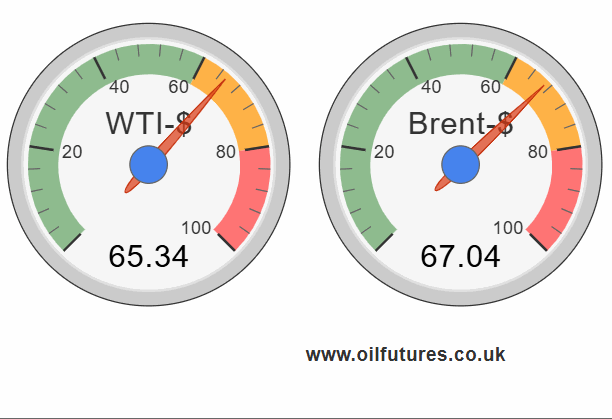 |
| www.oilfutures.co.uk |
Despite ongoing tensions in the Middle East, crude oil prices have remained remarkably steady. As of 09:53 GMT, WTI was priced at $65.23 and Brent at $67.02. Liquefied natural gas (LNG) was at $3.45.
Contrary to some analysts' and investment bankers' predictions of soaring oil prices, this did not materialize. While prices did jump by nearly 8% during the peak of the 12-day conflict between Israel and Iran, "presidential intervention" by President Trump appears to have played a role in bringing them back down to pre-war levels.
A significant escalation was avoided because Israel, instead of targeting Iran's oil infrastructure, primarily struck an oil storage facility in Tehran and a few similar sites believed to be supplying fuel for ballistic missiles. It's possible that the United States advised Israel to spare oil fields, understanding the potential impact on global oil prices.
The OPEC+ alliance is adding an additional 141,000 barrels to the market, as per their latest decision. Furthermore, reports indicate record-high US oil production. These combined factors signal ample supply in the markets, suggesting that claims of scarcity are speculative attempts to profit quickly.
A fragile ceasefire between Israel and Iran continues to hold, though Iranian rhetoric and the appearance of unidentified drones in Iranian skies suggest persistent tensions. Against this backdrop, Israeli Prime Minister Benjamin Netanyahu is scheduled to meet President Trump at the White House next week in what appears to be a hastily arranged meeting. On a more positive note, daily life in Iranian streets has returned to normal.
With the Iranian rial in freefall, Iran is not in a strong position to escalate the current crisis. Israel, too, has felt the impact, as some ballistic missiles penetrated its multi-layered air defense system despite a 90% interception rate. As no air defense system is foolproof, a small nation like Israel cannot afford to take risks in this area.
Even President Trump, who brokered the current ceasefire, believes the conflict between these two major Middle Eastern powers vying for regional dominance could reignite. A renewed war seems inevitable if Israel targets key Iranian military figures or the Supreme Leader. Additionally, unresolved issues surrounding Iran's uranium stockpiles could potentially draw American involvement into the conflict.
This suggests that regional volatility will likely persist for months unless a diplomatic breakthrough is achieved. The US, meanwhile, is determined to expand the Abraham Accords to include more Arab countries such as Syria, Kuwait, and Saudi Arabia. If successful, this ambitious goal could isolate Iran, potentially prompting a reevaluation of its long-held policies to remain relevant in the region.
With the Iranian rial in freefall, Iran is not in a strong position to escalate the current crisis. Israel, too, has felt the impact, as some ballistic missiles penetrated its multi-layered air defense system despite a 90% interception rate. As no air defense system is foolproof, a small nation like Israel cannot afford to take risks in this area.
Even President Trump, who brokered the current ceasefire, believes the conflict between these two major Middle Eastern powers vying for regional dominance could reignite. A renewed war seems inevitable if Israel targets key Iranian military figures or the Supreme Leader. Additionally, unresolved issues surrounding Iran's uranium stockpiles could potentially draw American involvement into the conflict.
This suggests that regional volatility will likely persist for months unless a diplomatic breakthrough is achieved. The US, meanwhile, is determined to expand the Abraham Accords to include more Arab countries such as Syria, Kuwait, and Saudi Arabia. If successful, this ambitious goal could isolate Iran, potentially prompting a reevaluation of its long-held policies to remain relevant in the region.







